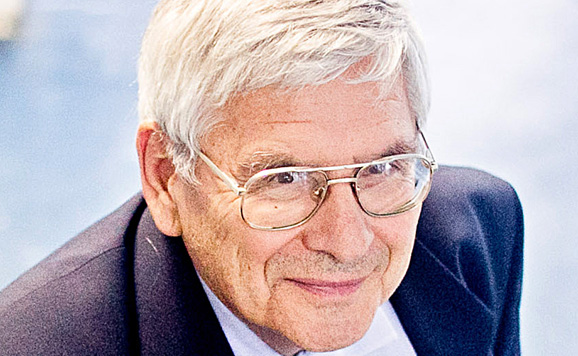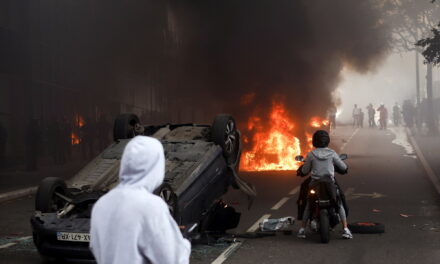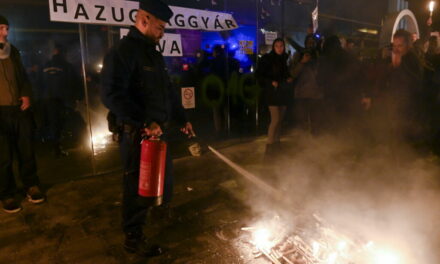In his interview with Vasárnap, economist Károly Lóránt
Károly Lóránt recently put it this way on his social media page: "Regardless of who's opinion of Viktor Orbán in this country, it is true that the eradication of European culture is underway in the West, as Spengler wrote 100 years ago in the twilight of the West... I consider Viktor Orbán suitable to fight such a fight, if only because he dares to go against the ruling power, while many are dying. Today in the West it is like here in the fifties."
You lived and worked in Brussels from 2003 to 2009. After 2009, he continued to visit Brussels for a decade, as he was Krisztina Morvai's adviser. How did you see the increasingly influential activities of cultural Marxist political groups in the European Parliament?
When I went to Brussels in 2003 at the invitation of a Danish representative, Jens-Peter Bonde, as his colleague, I was surprised to notice that freedom of speech is beginning to be like it was in the Rákosi era (two decades have passed since then, it is worse today). For example, people dared to talk about immigration only in the narrowest circle of friends ("in the kitchen"). In 2015, at an international conference, I heard the same thing from a participant who worked for the European Commission. He said that there are nine people working in his department, everyone is of the opinion that we don't need immigrants, but they don't dare to say this out loud because they are afraid that they will be fired, and that he spoke the truth, this is well supported by the dismissal of Zsolt Petry from Hertha . With our group, which was then called the Europe of Democracy and Diversities (EDD) and acted against the excessive centralization of the European Union, mainstream groups (people's party, socialists, liberals, etc.) were not discussed. Nigel Farage, who withdrew the United Kingdom from the Union, was in our group, and now representatives of the Alternative for Germany, AfD party are also there. The group is currently called Identity and Democracy, ID. They are waiting for Viktor Orbán to form a large group, so that they will be part of it.
Do you see a chance that France, Belgium or Germany will switch to a strict immigration policy in the coming years?
No. At the same time, most opinion polls show that the average European is fed up with immigrants. The platform for the debate on the future of Europe was opened only now, on April 19, but in the first few hours, around fifty opinions were already received on the migration section. The vast majority of them are in favor of a firm migration policy, but the leadership of the Union, as it has not done so, will not take into account the opinions of EU citizens in the future either.
The interest of the ruling elite, the background power, is to crush the aspirations of the nation-state as much as possible, and the admission of migrants serves this as well, since the majority of immigrants support the (usually socialist) parties representing the interests of the background power.
For example, Denmark is now trying to repatriate some migrants, but it is questionable whether this will be successful. Those who are already in the territory of the Union can be expelled, but it is impossible to get them to go home en masse, at most there will be one or two cases that can then be blown up in the media.
In Brussels, he made friends with István Lovas, the then correspondent of the Magyar Nemzet. How much time did you spend together?
I already knew the writings of István Lovas from Magyar Nemzet before we met. We met in person when the editorial office of Magyar Nemzet sent him to Brussels as a correspondent in 2004, and it was my task to get him an apartment. I had already been out there for a year, I wrote for the Hungarian Nation about things happening in the EU, I had an independent column entitled A week in Europe. We first met Pista at the Gellért confectionary, then usually outside once a week. There was also a third companion, Endre Barcs, who at one time was the Brussels correspondent of Hír TV. The program usually consisted of going cycling for an hour on Saturdays, then sitting down for a beer somewhere and discussing world affairs. But sometimes we also went on trips, we went to the beach, for example, or somewhere in the countryside, as we called Europe at the time, because Brussels was already full of immigrants - three of my bicycles were stolen from the bicycle parking lot of the European Parliament - but the countryside was free of them. Pista was a gourmet, he often invited us to his home, provided us - and possibly others - with all kinds of delicious sausages, bacon and cheese. He usually fell asleep around 10-11 in the evening, and that's when I told Bandi that we should go home, because Pista gets up at five in the morning to read the latest newspapers so that he can send his reports to the Hungarian papers by eight.
He had an incredible work ethic, he reviewed the daily press in ten languages.
The last time we met a few days before his death was in Sukoro, and together with other journalists we talked about how we could somehow work against the attacks on our country in the international press, but nothing came of it. Towards midnight, it was already apparent that he was tired, and I warned the others about this as well, who still had a lot to say... I drove him out to the highway ramp so he wouldn't get lost, when we got there, he waved goodbye. That was the last time I saw him.
Miklós Kelemen's full interview with Károll Lóránt HERE .
Featured image: Magyar Hírlap













